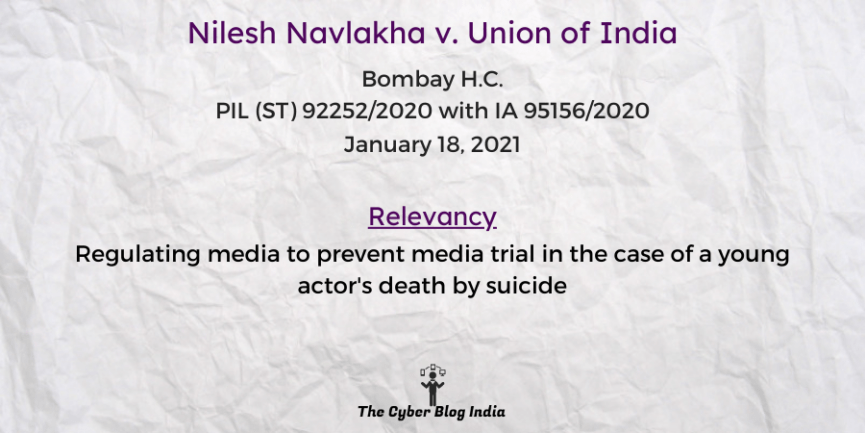Nilesh Navlakha v. Union of India

Nilesh Navlakha v. Union of India
(2021) 2 AIR Bom R 179
In the High Court of Bombay
PIL (ST) 92252/2020 with IA 95156/2020
Before Chief Justice Dipankar Datta and Justice G.S. Kulkarni
Decided on January 18, 2021
Relevancy of the case: Regulating media to prevent media trial in the case of a young actor’s death by suicide
Statutes and Provisions Involved
- The Contempt of Courts Act, 1971 (Section 2, 3, 13, 215)
- The Code of Criminal Procedure, 1973 (Section 37, 38, 39, 173, 327)
- The Indian Penal Code, 1860 (Section 124A, 505, 182, 192, 202, 203, 211)
- The Constitution of India, 1950 (Section 19, 20, 21, 39A, 275)
Relevant Facts of the Case
- Media channels widely reported a young actor’s death by suicide.
- Media reports led to a media trial, with media outlets questioning the integrity of investigation agencies involved in the investigation.
- According to the petitioners, the media has taken the roles of investigating agencies, adjudicators, and prosecutors in pronouncing people guilty when the investigation is under process. This has resulted in a jeopardising effect on the police’s reputation and adversely affected the administration of justice.
Prominent Arguments by the Advocates
- The petitioner’s counsel argued that the media intrusion into the private life of the victim’s family is a violation of the right to privacy guaranteed under Article 21. The counsel argued that these media trials only sensationalised the issue, undermining the concept of a free and fair trial.
- The respondent’s counsel submitted that media, the fourth pillar of democracy, can carry out investigative journalism until the matter becomes sub judice. The counsel argued that the petitioners have no locus standi in the cause of a private person.
Opinion of the Bench
- Overzealous investigative journalism in sensitive cases can qualify as interference in the administration of justice. Contempt of court would cover acts that affect a fair investigation of a crime and a fair trial.
- For the purpose of the Contempt of Courts Act, the starting point can be considered as the registration of FIR.
- Registration of an FIR can be seen as the starting point of the justice process.
- The courts can only regulate media to the extent of securing the rights of others under Article 21, and to preserving the sanctity of the criminal justice system.
- The PIL is maintainable, as the locus standi of the petitioners is not in question.
Final Decision
- Media should only display articles that are informative and are of public interest. The bench also issued a list of instructions for media houses. These instructions advise them to exercise restraint and desist from publishing any news item that can initiate any discussion, debate, or interview about the actor’s death.
Anjali Agrawal, an undergraduate student at the NALSAR University of Law, Anjini Pandey, an undergraduate student at Dr Ram Manohar Lohiya National Law University, Linet Christina Thomas, an undergraduate student at Lords Universal College of Law, and Ojasvi Gupta, an undergraduate student at the Faculty of Law, Banaras Hindu University, prepared this case summary during their internship with The Cyber Blog India in May/June 2022.
